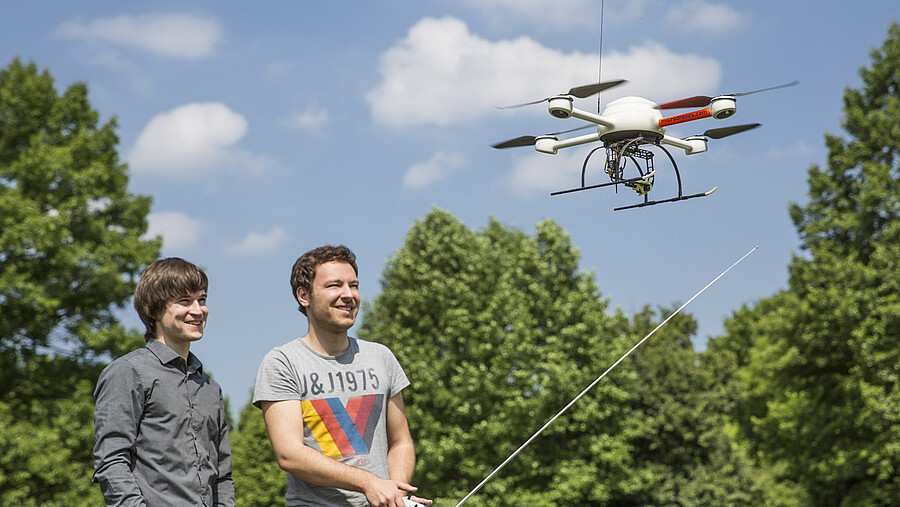Geodesy and Geoinformatics - Geomatics Track
(Master of Science)
Profile
German HZB: none
International application: German C1 OR English C1
Find out more
Stay abroad possible, but not obligatory.
Short Description
The master's programme in geodesy and geoinformatics is divided into three study tracks:
Geodesy and Geoinformatics covers a wide range of tasks and activities. The discipline deals with current social issues ranging from climate change to the impact of the growing world population on land. Data produced from geodetic satellite missions facilitate the global monitoring of sea-level rise. Geodetic methods document ownership of land and its valuation, including the real estate built on it – an important basis for sustainable urban and rural development. A resilient infrastructure is crucial for the future; geomatics makes an important contribution to structural monitoring, such as of the ageing transport infrastructure or the modelling of buildings using Building Information Management (BIM) methods. In addition, the development and geodetic use of innovative quantum-optical sensing is a future-oriented field of research.
In the “Geomatics” track of the master’s degree programme in Geodesy and Geoinformatics, you build on your knowledge from the Bachelor’s programme. To this end, in-depth basics are taught in advanced subjects. In the compulsory elective modules and the two projects, you will expand your skills and complete practical tasks as part of a team. In addition, the “Studium Generale” will enable you to attend courses offered in other degree programmes. The entire degree programme is offered largely in English.
Course Content
- Engineering surveying
- Methods of geodetic data analysis
- Land and real estate management
- Physical geodesy and gravimetry
- Satellite geodesy and space procedures
- Positioning and navigation
- Photogrammetry, computer vision and remote sensing
- Cartography, geoinformatics and geographic information systems
- Monitoring of climate change processes
- Data Science – focus on environmental data
The master’s degree programme takes four semesters and builds on content from the bachelor’s degree programme. Students take advanced subjects in which they expand on the knowledge gained during the bachelor’s degree programme. In the compulsory elective area, students have the opportunity to choose between various subject areas and to specialise accordingly. The optional area also enables you to attend courses offered in other degree programmes. As is the case at the bachelor’s stage, students are assessed continually.
The fourth semester of the master’s degree programme is set aside for the completion of a master’s thesis within six months. Students who have passed all of the examinations and successfully completed the master’s thesis are awarded the master’s degree. Graduates are conferred the title Master of Science (M.Sc).
The master’s degree programme requires that students produce a great deal more independent scientific work than is the case at the bachelor’s stage. In this way, graduates are prepared for undertaking future research and development tasks in industry or research institutions.
-
Foundations: Students should understand the fundamentals of geodesy and geoinformatics; a sound knowledge of basic science, mathematics and programming is a prerequisite.
-
Research: Students should also be interested in subject-specific and research-oriented interrelations. The ideal students are also open to new lines of scientific enquiry, creative, open to criticism and responsible-minded.
- Team work
As a graduate with a degree specialising in “Geomatics”, you will have excellent opportunities on the labour market. Potential employers include:
- Self-employed, publicly appointed surveyors
- Providers of geodetic and photogrammetric systems of measurement and analysis
- Manufacturers of positioning and navigation systems
- Surveying and robotics software providers
- GIS service providers
- Companies in the construction and raw materials industries
- Research institutions
- Surveying and cadastral administration authorities
Admission Requirements
An undergraduate degree in a related field of study, such as
For master's degree programmes with unrestricted admission, all applicants who fulfil the admission requirements will be admitted a university place. The exact admission requirements can be found in the admission regulations:
Application Deadlines
First-year students from Germany and the EU
- 1 June – 15 July of the year for the winter semester
- 1 December – 15 January of the year for the summer semester
First-year students from non-EU countries (VPD from uni-assist is required)
- 15 April – 31 May of the year for the winter semester
- 15 October – 30 November of the previous year for the summer semester
Students resuming their studies and transfer students from Germany and the EU (application in a higher semester)
- 1 June – 15 July of the year for the winter semester
- 1 December – 15 January of the year for the summer semester
Students resuming their studies and transfer students from non-EU countries (application in a higher semester)
- 15 April – 31 May of the year for the winter semester
- 15 October – 30 November of the previous year for the summer semester
Leibniz UNInsights – The student podcast
Please note that activating the video will result in the transfer of data to the respective provider. Further information can be found in our privacy policy.
Play video
Do you have questions about studying? We are happy to help!

30167 Hannover

30167 Hannover









